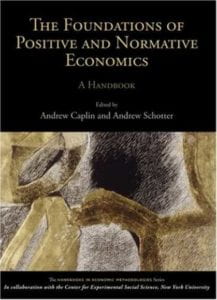
The Foundations of Positive and Normative Economics: A Handbook
Paperback / Oxford University Press / First Edition, 2010
This is the first book in a new series by Andrew Caplin and Andrew Schotter. Economists have been introducing new theories and new sources of data at a remarkable rate in recent years, and there are widely divergent views both on how productive these expansions have been in the past, and how best to make progress in the future. The speed of these changes has left economists ill at ease, and has created a backlash against new methods. The series will debate these critical issues, allowing proponents of a particular research method to present proposals in a safe yet critical context, with alternatives being clarified. This first volume reflects the challenges that are opened by new research opportunities. The goal of the current volume and the series it presages, is to formally open a dialog on methodology. The editors’ conviction is that such a debate will rebound to the benefit of social science in general, and economics in particular. The issues under discussion strike to the very heart of the social scientific enterprise. This work is of tremendous importance to all who are interested in the contributions that academic research can make not only to our scientific understanding, but also to matters of policy.

Microeconomics: A Modern Approach
Hardcover / South-Western College Publishers / New First Edition, 2009
Professor Schotter believes the future of teaching microeconomics will be heavily connected with the use of experimental tools. And with the exciting new Microeconomics: A Modern Approach, your students will be well prepared. Applying intermediate economics to everyday life, this innovative first edition is built on an experimental economics framework that emphasizes game theory, strategic analysis, and organization of the firm without skimping on traditional topics like consumer choice, production and markets. Each chapter and section builds upon a unifying theme of how economic institutions develop to solve problems that arise in a society. Concepts are presented within the context of a society that starts out in a primitive state of nature and gradually develops the characteristics and institutions of a modern economy. The text also nurtures critical thinking skills by presenting theories, as well as their deficiencies. Illustrating various points of view, Microeconomics encourages students to not just study theory, but apply their knowledge learned to real-world issues.
 The Economic Theory of Social Institutions
The Economic Theory of Social Institutions
Paperback / Cambridge University Press / New First Edition, 2008
The Economic Theory of Social Institutions uses game theory to analyse the creation, evolution and function of economic and social institutions. The author illustrates his analysis by describing the organic or unplanned evolution of institutions such as the conventions of war, the use of money, property rights and oligopolistic pricing conventions. Professor Schotter begins by linking his work with the ideas of the philosophers Rawls, Nozick and Lewis. Institutions are regarded as regularities in the behaviour of social agents, which the agents themselves tacitly create to solve a wide variety of recurrent problems. The repetitive nature of the problems permits them to be described as a recurrent game or ‘supergame.’ The agents use these regularities as informational devices to supplement the information contained in competitive prices. The final chapter explores the applicability of this theory, first by relating it to previous work on the theory of teams, hierarchies, and non-maximizing decision theory, and then by using it to provide a new approach to a variety of questions both within and outside economics
 Free Market Economics: A Critical Appraisal
Free Market Economics: A Critical Appraisal
Paperback / Basil Blackwell Publishers / Second Edition, 1990 (out of print)
This book is an account of one of the central issues in economics, namely the potential of the free market system to solve social and economic problems. It explains the basic assumptions of the “free market argument”, examines their historical development, presents the standard criticisms of them and demonstrates how they can lead to social outcomes unacceptable to a consistent free market advocate. Professor Schotter argues that while markets do work in many situations, they are not panaceas, and for some problems, non-market institutions organized and co-ordinated by the state are essential.
You must be logged in to post a comment.